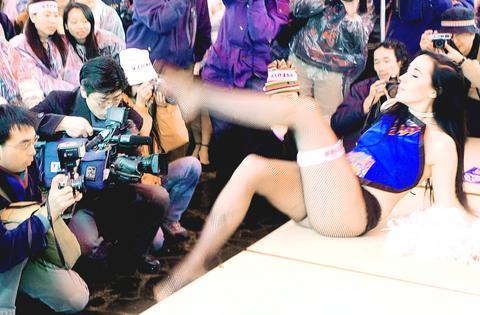About 200 sex workers and their supporters paraded through heavy rain in Taiwan's capital, Taipei, yesterday, demanding that anti-prostitution laws be changed.
The activists, many wearing headbands that read "decriminalize sex workers," said it was unfair to penalize sex workers but not their customers.

PHOTO: SEAN CHAO, TAIPEI TIMES
Prostitution is banned on the island, but widely tolerated.
Foreign supporters were among those in the parade.
Wearing a pink-and-red feather boa and long black gloves, Ruth Ross of the British-based International Union of Sex Workers said Taiwan could learn from her group's experience in forming unions.
"We believe sex workers all around the world must unite and stand up for their rights," Ross said.
She led the crowd in shouting "sex workers unite," waved a Union Jack and performed a partial striptease dance.
Other marchers were more discrete, covering their faces with masks and caps.
With Taiwan's March 20 presidential elections in mind, the activists marched from an upmarket shopping district to the campaign headquarters of the two presidential candidates.
Yesterday's parade was part of a four-day cultural festival sponsored by a local activist group, the Collective of Sex Workers and Supporters. It included seminars on the experiences of sex workers in various countries, and erotic dance workshops.

CHANGING LANDSCAPE: Many of the part-time programs for educators were no longer needed, as many teachers obtain a graduate degree before joining the workforce, experts said Taiwanese universities this year canceled 86 programs, Ministry of Education data showed, with educators attributing the closures to the nation’s low birthrate as well as shifting trends. Fifty-three of the shuttered programs were part-time postgraduate degree programs, about 62 percent of the total, the most in the past five years, the data showed. National Taiwan Normal University (NTNU) discontinued the most part-time master’s programs, at 16: chemistry, life science, earth science, physics, fine arts, music, special education, health promotion and health education, educational psychology and counseling, education, design, Chinese as a second language, library and information sciences, mechatronics engineering, history, physical education

The Chinese military has boosted its capability to fight at a high tempo using the element of surprise and new technology, the Ministry of National Defense said in the Quadrennial Defense Review (QDR) published on Monday last week. The ministry highlighted Chinese People’s Liberation Army (PLA) developments showing significant changes in Beijing’s strategy for war on Taiwan. The PLA has made significant headway in building capabilities for all-weather, multi-domain intelligence, surveillance, operational control and a joint air-sea blockade against Taiwan’s lines of communication, it said. The PLA has also improved its capabilities in direct amphibious assault operations aimed at seizing strategically important beaches,

‘MALIGN PURPOSE’: Governments around the world conduct espionage operations, but China’s is different, as its ultimate goal is annexation, a think tank head said Taiwan is facing a growing existential threat from its own people spying for China, experts said, as the government seeks to toughen measures to stop Beijing’s infiltration efforts and deter Taiwanese turncoats. While Beijing and Taipei have been spying on each other for years, experts said that espionage posed a bigger threat to Taiwan due to the risk of a Chinese attack. Taiwan’s intelligence agency said China used “diverse channels and tactics” to infiltrate the nation’s military, government agencies and pro-China organizations. The main targets were retired and active members of the military, persuaded by money, blackmail or pro-China ideology to steal

The High Prosecutors’ Office yesterday withdrew an appeal against the acquittal of a former bank manager 22 years after his death, marking Taiwan’s first instance of prosecutors rendering posthumous justice to a wrongfully convicted defendant. Chu Ching-en (諸慶恩) — formerly a manager at the Taipei branch of BNP Paribas — was in 1999 accused by Weng Mao-chung (翁茂鍾), then-president of Chia Her Industrial Co, of forging a request for a fixed deposit of US$10 million by I-Hwa Industrial Co, a subsidiary of Chia Her, which was used as collateral. Chu was ruled not guilty in the first trial, but was found guilty